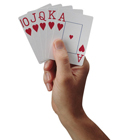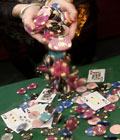打麻将中蕴藏的运气
打麻将会涉及多少运气?
由于麻将集砖的总数是144(或136,如果鲜花和四季声省略),并形成一个完整的四组和一对,很明显,这样赢的可能性是非常大的。当然在开始的时候处理手头收到的瓷砖然后确立最初的目标也是非常重要重要的,这也是非常容易碰到的,一个玩家从墙上得到一个超过半数完成套牌或从其他玩家手中获得则最终赢得比赛。
新手玩家也有可能幸运地击败高手玩家。即使在旧的规则,玩家也可以仅依靠运气赢得完整的游戏。虽然不一定与限价手(一种特殊的手,通常会自动得分的最高点)。重要的是要注意大的利润往往会失去更多。收集结合额外的瓷砖(如花卉,季节和多拉砖),或采用经典的回报计划奖金平均胜负手,根据所有的失败者,如果获胜的玩家是东,则付双倍。所谓的极限手是在美国和法国的罕见的规则(美国使用规则笑话和查尔斯顿,以帮助玩家收集大手,和法国的规则允许部分合并不规则的赢家相似)。
虽然运气在麻将上的意义是非常大的,但认为麻将是一个纯粹的财富游戏这也是一个严重的错误。从长远来看,一个熟练的玩家的目的是胜利,一个玩家如果仅仅靠运气,最后就会发现,游戏变迟早都会变得完全令人沮丧。与其说是因为他已经失去了他的运气,还不如说是因为有经验的玩家不断地毁掉了他对手赢得高分的那一手牌。通过快速和便捷的手法,似乎早就知道他需要什么样的瓷砖来完成他的那一手牌,然后毫无前奏的打击一个或两个有高得分的对手,
麻将的技巧与喜欢下棋或走纯粹的智力游戏所需的技能是不能比拟的。日语单词“ojozu”(通常翻译为“熟练”)的意思是“一个人知道如何去适应他的运气”,并准确地描述了人需要一个很好的麻将机。这并没有涉及任何企图,是基于迷信的基础来控制或强制运气,依靠能力努力控制运气的可能性发挥,以充分利用它,直到这个目标实现。
译文
How much luck is involved?
As the total number of tiles in a Mah Jong set is 144 (or 136, if Flowers and Seasons are omitted), and a complete hand is formed of four sets and a pair, it is clear that the number of possible winning hands is huge. Though the tiles received in the dealt hand are important for determining the initial goal, it is not so rare that a player ends up winning with a hand where more than half of the tiles of the completed sets have been picked from the Wall or from other players' discards.
It is also true that a novice player may be lucky enough to beat expert players. Even in the classical rules a player may win the complete game by just one lucky hand – though not necessarily with a Limit hand (a special hand that normally automatically scores the maximum points)。 It is important to note that big profits are often a result of a) collecting an average winning hand combined with bonuses for extra tiles (like Flowers, Seasons and Dora tiles), and/or b) using the classical payoff scheme, according to which all losers pay double if the winning player is East. The so called Limit hands are rare in other than American and French rules (the American rules use jokers and Charleston to help players collect big hands, and the French rules allow partially melded irregular winning hands)。
Though the meaning of luck in Mah Jong is undeniably great, it would be a serious mistake to think that Mah Jong is a sheer game of fortune. In the long run a skillful player is guaranteed to win, and a player relying solely on luck will find that the game becomes sooner or later utterly frustrating – not so much because he has lost his luck, but because experienced players constantly ruin his ambitious attempts for high-scoring hands either by going out on quick and easy hands or by seeming to know the tiles he needs to complete his hand, and then strike with one or two high-scoring hands without giving a clue.
Skill in Mah Jong cannot be compared with skill required in purely intellectual games like chess or go. The Japanese word 'ojozu' (often translated as 'skillful') means "one who knows how to adapt to his luck", and describes accurately the kind of talent required from a good Mah Jong player. This does not involve an attempt to control or force the luck (which is an endeavor based ultimately on superstition), but an attempt to control the likelihood of having luck on one's side – and ability to exploit it to the full, once this goal is achieved.
相关推荐
随机专题



 您现在的位置:
您现在的位置: 
 足球看盘技巧平手盘
足球看盘技巧平手盘 二十一点赌博游戏经验之谈
二十一点赌博游戏经验之谈 百家乐看灯投注方法分析
百家乐看灯投注方法分析 百家乐小路怎么看
百家乐小路怎么看


